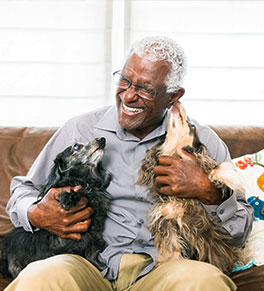The power of pets for older adults

Bringing a pet into your life can spark joy in unexpected ways — from playful messes to warm cuddles.
Beyond the endearing tricks, imploring looks and tail wags, pets also have a surprisingly positive effect on your well-being. Whether it’s encouraging you to get outside for daily walks or offering comfort during quiet moments at home, animals can contribute meaningfully to both your physical and emotional health.
These joys of pet ownership aren’t limited by age, but they can be especially profound for older adults.
As people grow older, they often face reduced social engagement and physical challenges may limit their ability to socialize. For some, the days may feel long or lacking in purpose. That’s where a pet can make a meaningful difference.
“For seniors who are feeling isolated, a pet can be transformational, offering connection and purpose,” says UCI Health geriatrician Dr. Lisa Gibbs.
If you’re considering a pet to enhance your life as you age, here are some things to keep in mind.
Benefits of pet ownership
Studies have shown that pet ownership is linked to a variety of health benefits including:
- Improved cardiovascular health and blood pressure control
- Increased opportunities for physical activity and exercise
- Decreased loneliness
- A marked drop in levels of cortisol and stress
- An increased in social interactions
- Improved mood and emotional health
Surprisingly, felines may provide superior health benefits. A 2022 study found that cat owners experienced a greater reduction in cardiovascular disease risk factors than other pet owners. Other research on homebound older adults who own cats, found evidence of lower levels of depressive symptoms compared with dog owners.
Another study of nearly 8,000 older adults who lived alone found that having a pet was associated with a slower rate of cognitive decline, especially in verbal cognition, memory and fluency.
Whatever pet you choose, Gibbs considers them important for older adults’ health and well-being.
“Caring for pets has also been shown to promote a sense of calmness, reductions in anxiety and blood pressure levels and for some older adults, they provide a sense of purpose,” says Gibbs.
Inspiring a fuller life
Pets often encourage older adults to increase activity levels.
Simply caring for a pet — feeding, bathing, grooming, playing and petting them — get a person moving. Dogs can be especially beneficial because they need daily walks that may in turn lead to more social interactions with neighbors and friends.
There are also well-trained therapy animals that allow people to participate in life more fully, says Gibbs. She notes that many of her patients have pet turtles, birds and fish that enhance their lives.
“The decision to own a pet is unique to every person, but if a patient expresses a desire to have one and is physically and cognitively able to care for it, I would support this decision,” Gibbs says.
It’s just as important to be fair to an adoptive animal and have plans for their care if the owner becomes very ill and no longer able to provide for their pet's needs, she cautions. “This may involve families or friends or rescue organizations who will take over if needed.”
Pet selection pointers
Before bringing home your new friend, it’s important to consider your lifestyle, needs, mobility level, budget and any health goals you are hoping to accomplish. The needs of each type of animal varies widely, so it’s best to think ahead.
The size of the pet, breed traits and temperament are important considerations. A little dog running around your feet could be a hazard for tripping and falling. A large dog could also pull you off balance and lead to a fall.
“Limiting the risk of falls is important since they can result in many injuries and even threaten one’s ability to live independently,” Gibbs says.
Struggling to control a pet or curb excessive barking can cause additional stress. Consider, too, whether you have the energy to train a puppy or kitten. Would a senior companion animal be a better fit?
Will you need assistance caring for your pet, either physically or financially? An animal with heavy grooming needs should be avoided if one has limited energy or arm strength, says Gibbs.
Then there's the cost of food, toys, grooming, vet visits, training and transportation needs.
“Pets can play a powerful role in supporting an older adult’s health and well-being, you just need to make sure the situation is a win-win for the owner and the pet,” says Gibbs.
Related stories
- Feeling good about aging
- Friendships for better health
- Protecting long- and short-term memories
- Fear of falling makes falls more likely
Explore further
Browse more blog posts by topic.




